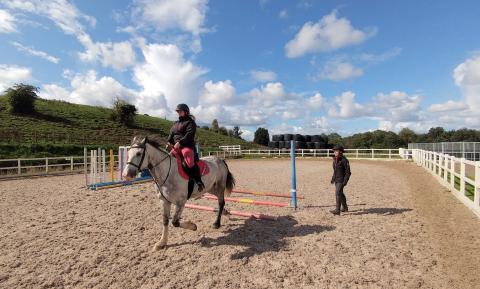Farriers work closely with horse owners and vets to prepare horses’ feet and fit shoes. They need practical skills to shoe both normal and defective feet and make shoes suitable for all types of work and working conditions. This involves:
• Checking the horse's leg, foot and hoof
• Discussing and agreeing the horse’s shoeing requirements with the owner
• Cutting away excess hoof growth and make sure the horse is balanced correctly
• Choosing the most appropriate shoe for the horse relating to its size, foot condition, activity, work and working conditions
• Fitting the shoe and complete any finishing off work
• Adjusting the shape of the shoe if necessary using the relevant tools.
Horseshoes are made either by hand or machine and can be fitted hot or cold. Their shape can be adjusted by the Farrier, using a hammer and anvil. Farriers sometimes have to discuss foot treatments with owners and vets and devise corrective measures to compensate for any faulty limb actions.
There are around 2,500 registered Farriers in the UK. Most are self-employed, working for a variety of clients and there is an ongoing demand for their skills. Clients include farmers, racehorse owners, private horse owners, the owners and managers of riding schools and stables, animal attractions and the military police. There may also be the opportunity to train as a Farrier within the Army through the Army's own specific training route.
Qualified Farriers are registered with the Farriers Registration Council (FRC) which can provide a list of all registered Farriers. As most are self-employed, some time is spent organising appointments with customers and finding new customers when necessary as well as ordering stocks and tools used for the job and carrying out general book-keeping and administrative work.
Working Conditions
Farriery is a skilled profession and Registered Farriers are capable of shoeing all types of equine feet and making shoes to suit all types of work and working conditions. The majority of Farriers are self-employed so business skills and customer care are important. Farriery is a regulated profession by law.
Working hours vary from week to week, depending on the needs of their customers. They do most of their work during daylight hours, but may also provide emergency cover which can be at any time of the day or night.
They travel between different customers, visiting farms, riding stables, and livery yards, to carry out their work. A driving licence is necessary as is a vehicle suitable for carrying around a mobile workshop of stock and tools.
Farriery is hard, physical work. It involves bending, lifting and walking, and sometimes working outdoors in all weather conditions.
Salary
Farriers usually charge an hourly rate or negotiate a fee for a whole appointment.
£16,000
£35,000
Getting started
You should have a genuine interest in horses, their care, behaviour and welfare, and enjoy working for different types of customers in a variety of different locations.
To become a Registered Farrier you must complete an Advanced Apprenticeship with an FRC Approved Training Farrier (ATF). You need to find an Approved Training Farrier (ATF) who will employ you for the apprenticeship. Work experience or voluntary work at riding schools, stables or on a farm, is valuable, as is horse ownership and riding skills.
What experienced workers can do
- Market your services and find new customers
- Manage a small business
- Maintain and operate mobile gas and coke fired forges
- Make shoemaking tools
- Handle and control equines
- Assess the overall condition and footcare requirements of the equine
- Determine the footcare and shoeing plan for equines
- Remove horseshoes and assess wear
- Trim and dress hooves
- Make and fit horseshoes
- Attach horseshoes and finish the shoeing process.
Personal qualities you should have
- Good communication skills
- Able to use initiative
- Able to prioritise work
- Able to be flexible and adaptable.
- Self-motivated
- Be able to work alone or as part of a team.
Next steps
The success of self-employed Farriers depends on them getting enough customers for full-time work. It is also important to build a reputation based on customer satisfaction and recommendation to other horse owners.
Permanent employment may be available in larger riding schools, stables, and horse breeders. There may be promotion opportunities to senior Farrier or to a management position. Overseas work may sometimes be available, especially within the horse breeding and racing field.
One option for career progression is to become an Approved Training Farrier (ATF) and be able to employ and train apprentice Farriers.
To become an ATF you will need to have been qualified for a minimum of 2 years and undertake the ATF course.
Useful links
The British Farriers & Blacksmiths Association
The Farriers Registration Council
Worshipful Company of Farriers
